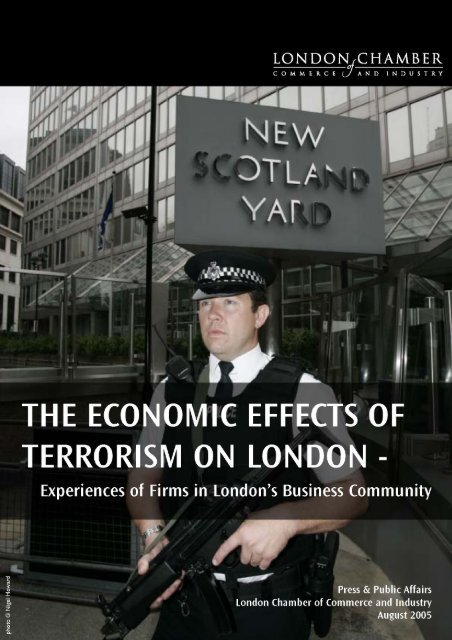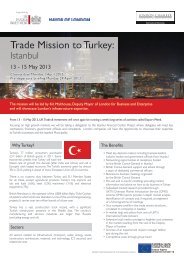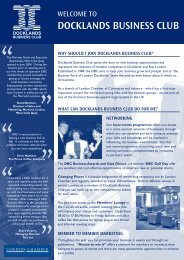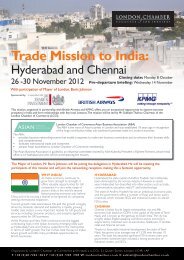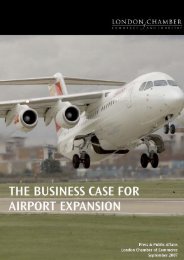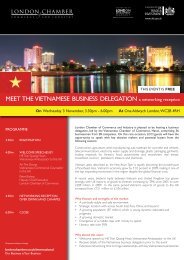The Economic Effects Of Terrorism On London â Experiences
The Economic Effects Of Terrorism On London â Experiences
The Economic Effects Of Terrorism On London â Experiences
- No tags were found...
Create successful ePaper yourself
Turn your PDF publications into a flip-book with our unique Google optimized e-Paper software.
<strong>The</strong> <strong>Economic</strong> <strong>Effects</strong> of <strong>Terrorism</strong> on<strong>London</strong> – <strong>Experiences</strong> of Firms in<strong>London</strong>’s Business CommunityPress & Public Affairs<strong>London</strong> Chamber of Commerce and IndustryAugust 2005- 1 -
IndexExecutive Summary……………………………………………………………….5<strong>The</strong> <strong>Economic</strong> <strong>Effects</strong> of <strong>Terrorism</strong>: Historical Context………………………….7<strong>Terrorism</strong> in <strong>London</strong>IRA attacks on <strong>London</strong> 1971-88IRA attacks on centres of commercial and economic activity 1988-2001IRA attacks on <strong>London</strong> Transport<strong>The</strong> <strong>Economic</strong> <strong>Effects</strong> of <strong>Terrorism</strong>: September 11 th 2001……………………….11<strong>The</strong> World Trade Center Attacks – the impact on New York<strong>The</strong> World Trade Center Attacks – the impact on <strong>London</strong> and the UK<strong>The</strong> <strong>London</strong> Bombings: 7 th & 21 st July 2005……………………………………..14<strong>The</strong> immediate effects on the <strong>London</strong> and UK economiesCase Studies: Businesses protect employees from public travelCase Studies: <strong>Economic</strong> impact of the July 7 th shutdown on <strong>London</strong> Chamber membersBenefits for someCase Studies: Business resilient but consumers running scaredCase Studies: Chamber members optimistic tourists will returnCase Studies: <strong>London</strong>’s retail heartland<strong>The</strong> longer term impact: A ‘terror tax’ on businessConclusion: Confidence is key…………………………………………………….21- 3 -
Royal Mail“We suspended our vehicles from moving between central <strong>London</strong> sites and in and out of<strong>London</strong> for the bulk of the day. At least 25% of the UK's mail moves through <strong>London</strong>,even if it's destination is elsewhere, so there was potential disruption through the UK”.However, Royal Mail was ‘very quickly able to recover’ and ‘in many cases serviceswere being resumed during the afternoon and evening of 7 July and deliveries were madeas usual the following morning.’Wedlake Bell (Solicitors)“We will be reviewing our disaster recover/business continuity plan as we realised it isbased on a disaster happening to the building rather than a terrorist attack or generaldisaster.”Virgin Trains“<strong>The</strong> summer season ‘leisure trip’ market to the capital is perhaps more vulnerable tooutside influences. <strong>London</strong> and its huge number of attractions, places to go and things todo and see is a very popular leisure destination during school holidays and is ofsignificant importance to train operators. Anecdotal evidence so far is encouraging andwhilst numbers appear to have been slightly down in July they seem to be increasing.Perhaps one explanation could be that with the holidays spreading over so many weeks, arescheduling of activities is taking place with the ‘<strong>London</strong> trip’ moving back by a fewweeks? <strong>London</strong> does of course provide an all year round leisure destination and theremay be opportunities to further develop this market as part of a wider ‘visit <strong>London</strong>’promotion, something we would be keen to be involved in.”Covent Garden Business Forum“<strong>The</strong> terror attacks are just the latest in a long line of potential set-backs for tourism andretail in Covent Garden and <strong>London</strong> after foot and mouth, 9/11, the congestion charge,and the strong pound crisis. And no one appreciates another kick when you are down…However, we remain optimistic and have long been aware that, where Covent Garden isconcerned, high footfall does not automatically equate to good trade figures. Many of ourregular visitors will not be deterred from coming to Covent Garden and we are confidentthat tourist numbers will quickly recover.”Harrods“Overseas customers who where already in <strong>London</strong> continued to visit the store in largenumbers - but the broad base of UK customers who live outside central <strong>London</strong> seemedto be the most reluctant to visit the store… <strong>The</strong>re has been a marked improvement inbusiness since then - with the weekends, especially Sundays, performing very well.Retailers will need to offer their customers ever more reasons to shop in the monthsahead and most importantly an intoxicating experience when they visit their stores.”- 4 -
Executive Summary• <strong>The</strong> <strong>London</strong> Chamber of Commerce and Industry conducted detailed interviewswith directors of more than 50 member businesses – starting exactly one monthafter the 7/7 terrorist attack. We have put their individual experiences in thecontext of a wide range of economic data concerning the performance of the<strong>London</strong> economy – both now and during previous terrorist campaigns.• <strong>The</strong> vast majority of businesses interviewed were in a position to respond robustlyto the July attacks in terms of their output. Despite significant disruption to thecapital’s transport network and the tragic loss of 52 lives, in every case businesseshad resumed normal operation within two working days at most. This isexemplified by the Royal Mail, which resumed its services in the capital on theafternoon of 7/7. A marketing consultancy and city law firm also remarked on therapidity of the return to work.• This durability was principally because the capital’s infrastructure only incurredlocalised damage. Because there was little disruption to the supply chain, therewas little evidence of the knock-on effect that the business community had fearedin a worst case scenario.• <strong>The</strong> example of the 2004 Madrid bombings shows that a city can swiftly bounceback from attacks on a similar scale to 7/7 and that the economic cost can berelatively short-term, even in the terrorism-sensitive tourism sector.• However, although many businesses were relieved that the tangible impact of theattacks had been small, confidence has inevitably been affected in the short-termat least. This has resulted in a pronounced impact upon firms in vital sectors of the<strong>London</strong> economy such as tourism and retail – although even here there arebusinesses, such as <strong>London</strong> City Airport and Docklands Light Railway, whichreport no adverse effect.• Confidence in the <strong>London</strong> economy had deteriorated sharply even before the<strong>London</strong> bombings, indicative of the sense of uncertainty that businesses feel aboutthe macro-economic picture. Now that the threat of further terrorist attacks hasbeen added to rising oil prices and a sharp downturn in consumer spending, thereis every chance that business confidence will continue along its present downwardtrajectory. It is precisely this coalescence of adverse factors which both BritishAirways and the Covent Garden Business Forum cited as reasons for cautionabout the medium-term outlook.- 5 -
• Neither has the cost of the attacks been confined to the most at risk sectors.Providing alternative means of transportation for staff unwilling to use publictransport into central <strong>London</strong> was the principal cost of the attack for two smallfirms.• Other firms are now spending money to update their existing contingency plans.<strong>On</strong>e City law firm said that its existing plans dealt with an attack on their buildingbut not the knock-on effects of disruption elsewhere in the economy. It should notbe assumed that small businesses in particular are in a position to shoulder thesecosts lightly.• <strong>The</strong> <strong>London</strong> Chamber of Commerce is advocating the establishment of a rewardscheme designed to encourage information to be volunteered on a confidentialbasis which leads to the foiling or solving of a terrorist attack.• In the medium-term a ‘buddy scheme’ should be established whereby largecompanies expressly take on responsibility for helping their smaller neighboursstay in business in the aftermath of disasters. Also, far more companies shouldstart to make use of the pager system run by the City police.• <strong>On</strong> a <strong>London</strong> level, policy-makers should consider three moves. Firstly, thesuspension of the congestion charge for a full month. This would be a sufficientlylong trial period to gauge its efficacy in kick-starting the retail sector in central<strong>London</strong>.• Secondly, the introduction of free bus travel on Saturdays. Again, this movewould be an experiment for a limited time designed specifically to draw people tothe West End.• Thirdly, the continuation of highly visible policing in <strong>London</strong>. In order tomaintain confidence it is imperative that the public continues to see uniformedofficers travelling on the Underground and bus system.• <strong>The</strong> <strong>London</strong> Chamber of Commerce believes that these initiatives would bolsterthe confidence of firms in the private sector as they enter a period when theeconomic outlook is far less benign than at any time since the present Governmentcame to power.- 6 -
1. <strong>The</strong> <strong>Economic</strong> <strong>Effects</strong> of <strong>Terrorism</strong>: Historical Context<strong>Terrorism</strong> in <strong>London</strong><strong>London</strong> is no stranger to terrorism and bombings. As early as 1867 the Fenians, an Irishseparatist group, detonated a bomb at Clerkenwell Prison, killing twelve people andinjuring more than a hundred. Between 1883 and 1885 the Fenians waged a widerterrorist campaign in <strong>London</strong>.Over the following years the city witnessed a rising tide of social and political unrest withradical groups and anarchists launching intermittent terror campaigns until shortly beforethe Second World War, when the Irish republican movement returned. In 1939 the IRAdetonated 59 bombs within the capital. <strong>London</strong>, with its high concentration of political,financial and diplomatic institutions and diverse population has always been a majortarget for terrorist organizations.IRA attacks on <strong>London</strong> 1971-88<strong>The</strong> IRA recommenced terror operations against targets on the UK mainland in the early1970s. <strong>The</strong>se operations were carried out by a variety of different cells and groups andwere not limited to any particular type or location of target. In <strong>London</strong>, where most of theattacks occurred, targets ranged from the Tower of <strong>London</strong> (1974), and the Post <strong>Of</strong>ficeTower (1971) to the House of Commons (1974 and 1979), Hyde Park (1982), the OldBailey (1971) and the home of former Prime Minister Edward Heath (1974). Commercialtargets included Harrods (1973 and 1983) and Oxford Street (1974 and 1981).<strong>The</strong> terror campaigns included periods of sustained activity, seemingly indiscriminateviolence against civilian targets in <strong>London</strong> and widespread public fear. From mid-1974until December 1975 a four-man IRA cell subsequently dubbed the ‘Balcombe StreetGang’ (after the <strong>London</strong> street where they conducted a six day armed siege leading totheir arrest) waged an 18 month campaign of violence in <strong>London</strong>. <strong>The</strong> group attackedpubs and restaurants across the capital, including the Hilton Hotel in Park Lane, Walton’srestaurant in Chelsea and Scott’s Oyster Bar in Mayfair. <strong>The</strong>y were also responsible foran abortive attack on the Ritz, the assassination of Guinness Book of World Records cofounderRoss McWhirter and carried out the pub bombings for which the Guildford Fourwere wrongly jailed. <strong>The</strong> ‘Balcombe Street Gang’ carried out ten bombings during theirfirst five days of operation in 1974 and, on 27 January 1975, went on to detonate fivedevices in a single day. <strong>The</strong> Metropolitan Police response to the Balcombe Street Gang’sreign of terror was for a long time the largest deployment of armed police in the UKduring the post war period – only recently eclipsed by the security that surroundedPresident George W Bush’s state visit to the UK in 2003 and the current police operationsfollowing the 7/7 bombings.- 7 -
It is hard to gauge the economic impact of the IRA’s early offensive operations in the UKbecause these operations were waged over a very long period, were directed against awide variety of targets, were conducted with varying degrees of ‘success’ by the terroristsand varied greatly in terms of the tempo and intensity of activity. <strong>The</strong>y were alsoconducted against the backdrop of considerable economic and political turbulence athome and abroad, typified by escalating industrial unrest, the oil crisis and the three-dayweek.Similarly, terrorism was also not just limited to the UK – during this period the PLO andother Palestinian groups began targeting civilian aviation for hijacking and attacked the1972 Olympics in Munich, the Baader-Meinhof Gang attacked US bases across WesternEurope while far-right extremists in Italy conducted a number of bombings and Basqueseparatist group ETA began their terror campaign in Spain. In fact, the IRA were not theonly terrorists operating in <strong>London</strong>: an anarchist group calling itself ‘<strong>The</strong> Angry Brigade’bombed the home of Robert Carr, the Employment Minister (1970) and Iranian dissidentslaunched an ill-fated hostage attack on the Iranian Embassy (1980) during the sameperiod.IRA attacks on centres of commercial and economic activity, 1988-2001<strong>The</strong> periods 1990-96 and 2000-01 saw a dramatic rise in republican terrorist activity onthe UK mainland as first the Provisional IRA and then the dissident ‘Real IRA’ launchedrenewed terror campaigns. Although many of these attacks were aimed at ‘traditional’IRA targets such as military bases and political figures, the terrorists also targetedfinancial and commercial centres in <strong>London</strong> and elsewhere with the clear aim ofdisrupting economic activity. Targets in <strong>London</strong> included the <strong>London</strong> Stock Exchange(1990), the Baltic Exchange (1992), Oxford Street (1991 and 1992), Bishopsgate (1993),and Canary Wharf (1996). Outside <strong>London</strong> the IRA targeted shopping centres inBlackpool (1991), Warrington (1993) and Manchester (1996).Although these IRA attacks were bigger and more focused than previous republicanoffensives, they had little economic impact. Although the IRA succeeded in blowing aten-foot hole in the side of the <strong>London</strong> Stock Exchange in 1990, forcing the evacuation ofthe trading floor, the central information systems integral to the exchange’s automatedtrading operations remained unaffected. As the then chairman of the Stock Exchange,Andrew Hugh Smith, said: “If the purpose of this callous act was to bring the City to ahalt, they have failed singularly; our systems and services have functioned perfectly, andtraining has continued as normal.”Prior to the 9/11 attacks, the IRA’s bombing of Bishopsgate in the City of <strong>London</strong> inApril 1993, which had an insured cost of $907 million, had been the world’s mostexpensive terrorist attack. <strong>The</strong> full cost of the Bishopsgate attack was much higher as itinflicted extensive damage to Liverpool Street station, caused the closure of parts of the- 8 -
City for several days and resulted in the demolition of a number of office buildings thathad been rendered structurally unsound. However, the economic effect of thisconsiderable disruption was minimal. <strong>The</strong> economy continued to recover during thesecond quarter of 1993 just as it had previously and the Bank of England did not refer tothe incident in its May 1993 economic assessment.IRA attacks on <strong>London</strong> TransportDuring both of the above phases of the IRA offensive against the UK mainland attackswere made on <strong>London</strong>’s transport system, often attacking the network several times in ashort space of time in order to maximize disruption. During a 48 hour period inSeptember 1973 bombs were detonated at Euston, King’s Cross and Victoria stationsinjuring 21 people. In another 48-hour period, in March 1976, bombs were detonated on atrain at Cannon Street and a tube train at West Ham, killing one and wounding nine. Athird device was defused at Oxford Circus Underground station.More recently bombs were detonated at Paddington and Victoria train stations in 1991and later the same year the IRA caused chaos for commuters on two consecutiveMondays by detonating a device on an overland line in South <strong>London</strong> and then plantingincendiary devices on tube trains at Harrow and Neesdon stations a week later. In 1992an incendiary device was found on a tube train at the Elephant and Castle depot andbombs were detonated at <strong>London</strong> Bridge mainline station and Hampstead tube. <strong>The</strong>following year South Kensington tube station was targeted. <strong>The</strong> national transportnetwork was severely disrupted in 1997 when the IRA called in a number of hoax bombwarnings against stations and motorways in addition to planting a few minor devices. In2000 the Real IRA also targeted the tube system, planting two bombs on the track atEaling Broadway Underground station. Both devices were defused following a warning.Although these attacks inflicted casualties and caused considerable disruption in theshort-term, they did not have a significant economic impact. As transport commentatorChristian Wolmar has said: “In the days of the IRA bombs, <strong>London</strong>ers generallycontinued to work normally and it is to be hoped that they so again after these ghastlyoutrages.” (‘We have to make sure the system stays open’, Daily Express, 8 July 2005).It is also worth noting that, in more than 30 years of operations, the IRA neverdeliberately targeted the <strong>London</strong> bus system. In 1996 a Routemaster was destroyed nearAldwych when a bomb went off, killing the IRA bomber who was transporting it toanother location. Former senior IRA commander Sean O'Callaghan recently said the lackof bus bombings by the IRA during the Troubles was in part due to the fact thatconductors could spot abandoned bags or suspicious behaviour. (BBC, 18 July 2005) (In2003, Mayor Livingstone scrapped plans to put a conductor on every bus, because he saidthe time they would save collecting tickets was not worth the £350m annual cost).- 9 -
It is important to note that there were considerable differences between the nature andobjective of the IRA bombing campaigns and those of the 7 July bombers. In many casesthe IRA aimed to cause disruption and create fear without inflicting too great a loss of lifeagainst civilians because this would have a negative impact upon the republicanmovement’s image and political aims. Paul Wilkinson, chairman of the Centre for theStudy of <strong>Terrorism</strong> and Political Violence at the University of St. Andrews recentlypointed out that “We are dealing with a completely different level of severity. July 7wasn't the kind of thing the IRA would attempt. <strong>The</strong>y did tend to give warnings” (Cited in‘<strong>London</strong> Security Reaches Tightest Ever, Surpassing Era of IRA’, Royal United Services Institute, 2August 2005)- 10 -
2. <strong>The</strong> <strong>Economic</strong> <strong>Effects</strong> of <strong>Terrorism</strong>: September 11 th 2001<strong>The</strong> World Trade Center Attacks – the impact on New YorkComparisons of the economic impact on New York following September 11 th 2001 andon <strong>London</strong> following the recent attacks in July 2005 must be undertaken with greatcaution since the extent of the damage was in itself incomparable. Indeed over 14,500New York businesses were destroyed or seriously disrupted as a result of the attack.Nonetheless useful lessons can be learnt and it is important to understand the tremendousimpact which the New York attack had if only to ensure a sustained and high level ofvigilance and security in <strong>London</strong>.In addition to the immediate economic impact of the attacks on the New York economy,estimated in November 2001 to reach as much as $83 billion (<strong>The</strong> Century Foundation,<strong>Economic</strong> Impact of terrorist Attack, May 13 2002), there are significant longer-term economicrepercussions in terms of business relocation, loss of tax revenue, fall in property values,a drop in tourism and its impact on the retail, hotel and leisure industries. For example in2002 it was estimated that the New York City Finance Department would collect $200million less in property taxes than in the previous fiscal year, with the World TradeCenter responsible for $70 million of the loss. <strong>The</strong> remainder is a result of the decreasesin value of other property in the area and, interestingly, by a reduction in the value ofManhattan hotels (-19%) and parking lots (-9%) resulting from the subsequent decline intourism (<strong>The</strong> Century Foundation, <strong>Economic</strong> Impact of Terrorist Attack, May 13 2002). Nonethelesson a more positive note, <strong>The</strong> Century Foundation report indicates that, six months on,commercial property vacancies and rents were beginning to stabilise. If the New Yorkproperty market can recover then it is almost inevitable that the <strong>London</strong> (UK) marketwould do the same, no matter how large-scale the attack.Business and consumer confidence were both severely affected. With confidence alreadylow by early September 2001, it plummeted to the levels seen following the Iraqiinvasion of Kuwait in 1990 and beyond those seen after the terrorist attacks in the 1990s(<strong>Economic</strong> Consequences of <strong>Terrorism</strong>, OECD <strong>Economic</strong> Outlook 71, 2002). Forecasts for economicgrowth were downgraded as a result, reduced by 0.5% for 2001 and 1.2% for 2002.Whilst real GDP did fall in the third quarter 2002, it actually increased in the finalquarter. However on a cautionary note this was in no small part due to an improvementin household consumption arising from exogenous factors, namely a fall in energy prices,and increased government spending rather an improvement in US economic performanceper se.In transport terms it is interesting to note the significant financial impact of the need forincreased security on public transport. In addition to the $1.7 billion required to rebuild- 11 -
the damaged underground system - and the estimated $531 million in expenses to fundrescue and recovery, lost fares and reduction in tax - a massive $1.1 billion was requiredto enable the New York Metropolitan Transport Authority to improve security on thecapital’s public transport system (<strong>The</strong> Century Foundation, <strong>Economic</strong> Impact of Terrorist Attack,May 13 2002).<strong>The</strong> economic impact resulting form a downturn in travel and tourism was enormous,estimated at between $7 billion to $13 billion in lost revenue and 25,000 lost jobs by2003. Visitors were expected to fall by 14% in 2001 compared to the previous year (<strong>The</strong>Century Foundation, <strong>Economic</strong> Impact of Terrorist Attack, May 13 2002). As in the case of theproperty market however, despite their devastating impact, these effects were to proverelatively short-term with a rise in hotel occupancy rates six months after September2001.<strong>The</strong> World Trade Center Attacks – the impact on <strong>London</strong> and the UKFollowing September 11 th , the IMF was to downsize its forecast of UK economic growthin 2002 by 0.6% from 2.4% to just 1.8% (Price Waterhouse Coopers, A Discussion of the <strong>Effects</strong>of September 11 th on the <strong>London</strong> Economy, November 2001). Actual growth for 2002 reached just1.6% in 2002 according to the <strong>Of</strong>fice of National Statistics, the weakest economic growthfor more than decade. More worrying still for <strong>London</strong> business, the ONS highlighted thehotel and restaurant sector as contributing to the gloomy situation in 2002 (RTE Business,UK 2002 economic growth slowest in 11 years, 26/03/32). This must be seen as a clear warningfor 2005 and 2006.In terms of individual businesses, in a survey of members conducted after the New Yorkattacks the Institute of Directors reported that 20% of members had increased businesssecurity since September 11 th , including 52% who carried our risk assessments to assesstheir vulnerability to attack and 47% improving security at access points (Institute ofDirectors, Profits, loss and fear: doing business under the shadow of terrorism, 2005). Nonetheless it isimportant to note that following the New York attack, UK businesses still consideredgeneral crime against business to be a greater risk than terrorism. <strong>On</strong>ly 15% hadintroduced these measures as a direct reaction to the increased threat of a terrorist attackand only half of all respondents have in place a contingency plan to protect against aterrorist attack. 33% of firms have, however, changed the way they conduct businessmeetings and travel, favouring e-mail, and conferencing (video, web and telephone) overtraditional face-to-face meetings. This is, moreover, a good way for businesses to reduceoverall operational costs.<strong>On</strong> a similarly positive note, 8% of businesses considered the fear of terrorism to haveactually improved their profitability – 53% of which were from technology businesses,27% security consultants and 23% manufacturers of security equipment (Institute ofDirectors, Profits, loss and fear: doing business under the shadow of terrorism, 2005). Indeed thissituation has been replicated following the July 2005 attacks, with the taxi industry and- 12 -
cycle stores in <strong>London</strong> reaping the benefits of the transport disruption and general fear oftravelling on the capital’s public transport. In transport terms, the IOD research foundthat 39% of businesses in <strong>London</strong> had been adversely affected by security-relatedtransport delays compared with 24% nationally. Interestingly although 63% of directorsquestioned supported the introduction of identity cards, only 38% thought them likely toreduce the threat of terrorist activity against the UK.- 13 -
3. <strong>The</strong> <strong>London</strong> bombings: 7 th & 21 st July 2005<strong>The</strong> immediate effects on the <strong>London</strong> and UK economiesLatest research shows that even before the first attack on 7 th July, business confidence in<strong>London</strong> had slumped to levels not seen since the eve of the Iraq War in 2003. In thesecond quarter of the year the number of firms expecting the UK economy to improveover the next 12 months stood at just 19%, compared with 36% of businesses surveyedby the LCCI which said it would worsen.More worryingly perhaps for the capital itself, a balance of only +2% of <strong>London</strong>businesses expect the <strong>London</strong> economy to improve during the next 12 months, a dramaticslump given the +16% balance seen in the first quarter of the year.As expected, the rate of interest has been reduced in August by one quarter percent to4.5%, although this would likely have been the case even without the attacks on <strong>London</strong>the previous month. <strong>The</strong> attacks have not come at a good time for the <strong>London</strong>economy, not just in seasonal terms at the beginning of the summer tourist peak but alsoin economic terms. <strong>Economic</strong> growth is currently the weakest seen since 1993 (Times<strong>On</strong>line, Focus: Is the economy bombproof? 24/07/05).Figures suggest a decrease in West End footfall of a massive 20 to 30% since the firstspate of attacks (Evening Standard, 25/07/05) whilst the number of people saying they wouldchange plans in terms of visiting central <strong>London</strong> rose from 21% after the first attack to27% after the second (<strong>The</strong> Times, 26/07/05).Member Companies’ Experience: Businesses Protect Employees from Public TravelRespondents reported that their employees still harbour genuine concerns about travellingon public transport, leading to increased costs in travelling by car or taxi. An exporttrading firm based outside central <strong>London</strong> reported that it had changed from getting itsstaff to deliver important shipping documents to the City and have instead begun usingcouriers. A senior manager with the company said: “We did not want to expose anyemployee to the stress of going into the City so soon after the bombings, so sent thedocuments by motor cycle courier. This is a regular requirement, and for the next fewweeks we will be using a courier for our documents. Obviously, this will increase ourcosts.” <strong>The</strong>se costs must be met either by the employer or employee. <strong>The</strong>y are anadditional burden that can ill be sustained in anything but the very short-term.- 14 -
Member Companies’ Experience: <strong>Economic</strong> impact of the July 7 th shutdownA spokesperson for Royal Mail told the <strong>London</strong> Chamber of Commerce: “Royal Mailwarned customers that mail collections and deliveries across the UK would be disruptedbecause of the incidents across the <strong>London</strong> transport network on 7 July. We suspendedour vehicles from moving between central <strong>London</strong> sites and in and out of <strong>London</strong> for thebulk of the day. At least 25% of the UK's mail moves through <strong>London</strong>, even if it'sdestination is elsewhere, so there was potential disruption through the UK.”<strong>On</strong>e firm, a large frozen foods manufacturer based outside central <strong>London</strong>, reported that,although the attacks had no impact upon customer numbers or trading figures, theirbusiness had nonetheless been disrupted: “None of our staff were affected except ourchairman, [who] got stuck in his <strong>London</strong> office all day on 07/07 and his staff there had towalk from St James’s Park to Charing Cross. A couple of functions and events werecancelled on the next day. <strong>On</strong>e of our major customers is based in Central <strong>London</strong> andthey cancelled a visit to us on 08/07 and when it was re-arranged we offered to collectthem by car as they were reluctant to use the tube.”However, the immediate impact of the effective shutdown of central <strong>London</strong> on July 7was not as serious as might have been imagied. Many companies reported that they wereable to resume limited operations later that day or on Friday 8 July. Royal Mail, forexample, said they were “very quickly able to recover” and “in many cases services werebeing resumed during the afternoon and evening of 7 July and deliveries were made asusual the following morning.” Another firm, a public relations agency, reported that theyhad cancelled any meetings scheduled for 7 or 8 July but “by Monday most staff werein.”Nicola Wright, HR and facilities manager of solicitors Wedlake Bell, said: “Our firmcoped quite well. Most employees managed to get in on the day and only a few couldn'tget in on the Friday. We will be reviewing our disaster recover/business continuity planas we realised it is based on a disaster happening to the building rather than a terroristattack or general disaster. Obviously there were lots of rumours on the day. My firmused to be based in Westminster and I subscribed to a newsletter/update service run bythe police in conjunction with the council which used to provide updates on issuesrelating to the local area. Perhaps all police stations and councils could do this as ageneral rule. Regular e-mails and information can be sent to a large number oforganisations in one go.”Describing the immediate impact upon their business, Virgin Trains said: “In commonwith many other train operators we experienced an immediate and predictable downturnin business on 7th July, as people were told not to travel to <strong>London</strong> and then thefollowing day as many people chose to stay at home. <strong>The</strong> impact of this day being aFriday is significant as many chose to finish the working week early given the continuingdisruption to the tube network. By the Monday however there was very much a feeling of- 15 -
‘back to normal’ and our trains were healthily loaded during the morning peak period.<strong>The</strong> resilience of the population at large should not be under estimated.”Tony McNally, managing director of security consultants Amicus Mentor Ltd, said hisfirm had felt a definite impact from the recent terror attacks. He added: “We were not thatsurprised to hear that a high proportion of businesses in <strong>London</strong> do not have acontingency plan to review. For many organisations that do not have in-house securitythis can be quite a daunting prospect. But it is surprising that even since the July attacks,businesses are still not talking to their neighbours. During surveys carried out since July,we have found that building, security and facility mangers at three very large buildingcomplexes had still not spoken to businesses on their doorstep about cooperating witheach other. We notice the absence of the normal - and the presence of the abnormal - athome, and we need to encourage the same at work. It is worth remembering thatdeliberate threats can only be realised if the opportunity exists, and therefore every effortshould be made to remove or minimise those opportunities.”An LCCI member company working in the aviation sector reported that although theirlandline communications were disrupted for several days, their internet and emailconnections, which were provided by a different supplier, were unaffected and allowedfor the continuation of business. According to their chief executive there was ‘a lessonthere possibly for others in spreading the risk’. Another business, an employment agency,highlighted that their business was reliant upon mobile phones and they found that thenetwork outage left them unable to check on the safety of their staff in the field, althoughthey were able to resume a limited service during the afternoon of 7 July. <strong>The</strong> firm addedthat the impact of the attacks was mitigated by their flexible workplace policy, withcritical facilities based outside central city locations.A senior manager with a large West End retail chain said that the impact on their businesscould have been a great deal worse if the national rail network had been unavailable forthe day. <strong>The</strong> director of a recruitment agency based in Canary Wharf pointed out that theimpact of the 7 July attacks on their business was minor compared the aftermath of theCanary Wharf bombing of 1996, when the firm had been unable to gain access to theiroffice for three days.Benefits for someCertain sectors of the <strong>London</strong> economy have received a boost since the attacks, mostnotably security companies, taxi firms and cycle stores. Evans Cycles, for example,reported a doubling of sales in the two weeks following the first attack (Times <strong>On</strong>line, Focus:Is the economy bombproof? 24/07/05). More surprisingly, it seems <strong>London</strong>’s theatres have nottaken the knock which might have reasonably been expected showing a 7% year-on-yearincrease in attendance (BBC News, West End recovers after attacks, 04/08/05). Whilst security isan issue, with 72% of those questioned feeling an increased threat in travelling in and outof the capital, it does not seem to have dented theatre-goers resolve to attend as planned.- 16 -
Member Companies’ Experience: Business resilient but consumers are fearfulMany businesses are doing their best to make their own luck. Planet Hollywood forexample has offered child free dining in an attempt to reverse a fall in trade. <strong>London</strong>ersthemselves should be encouraged to support local businesses. It is disappointing to seefrom <strong>The</strong> Guardian’s research, evidence suggesting that it may be <strong>London</strong>ers themselveswho are leaving the centre in the evening rather than the tourists (<strong>The</strong> Guardian, <strong>London</strong> feelsthe chill as takings fall,, 30/07/05). Nonetheless it has been estimated that the resultant fall intourism could cost in excess of £300 million.Location is one major factor in determining how different tourist destinations have seentheir business affected. Central <strong>London</strong> destinations such as the Tower of <strong>London</strong> andMadam Tussauds have seen visitor figures drop to up to 15% below those for the sameperiod last year while outer <strong>London</strong> destinations, such as Kew Gardens and RAF Hendon,have seen figures rise by 10% and 14% respectively. (<strong>The</strong> Guardian, ‘Plan to coax shoppers backto West End after bombs,’15 August 2005)<strong>On</strong> a more positive note, latest figures from the tourism company, Cheapflights, suggestthat the attacks have not had as detrimental effect on <strong>London</strong> tourism as initially feared.In July <strong>London</strong> remained the lead destination for visitors to the Cheapflights.co.ukwebsite, ahead of New York in second place. Despite a ‘dramatic’ drop in web traffic onJuly 7 th and 8 th , visitor numbers to the site had returned to normal by the weekend (<strong>The</strong>Guardian, <strong>London</strong> still no1 destination, says travel site, 10/08/05).Member Companies’ Experience: optimism that tourists will return<strong>The</strong> vast majority of respondents are optimistic that 7/7 will not impact substantially oneither the <strong>London</strong> or UK economies. Anthony Gould of Anthony S Gould InternationalMarketing Consultants, said: “I think the impact on <strong>London</strong>’s economy, providing thereare no more serious incidents, will be slight with the main effect being felt by retailers,restaurants, bars, etc rather than businesses where staff will have to come into <strong>London</strong>.<strong>The</strong> main effect will be to switch the above three retail trades to out-of-<strong>London</strong>destinations, although thinking people will probably realise that retail parks such asBluewater and Brent Cross are also very high risk targets. Tourism will be affected in theshort-term but should recover in the medium-term.”Sandi Goddard, managing director of marketing consultants Goddard Delaney Ltd,estimated that the outlook for tourism was not as grim as some analysts had predicted.She said: “I am sure that tourism will once more be affected, although I understand thatmy American intern is still expecting his mother to fly over in two weeks’ time (despiteher very real concerns) and he tells me all the other interns whose parents were intendingto visit Europe will still do so, which is good news. As to other business, it is hard to say.We do have the positive news of the Olympics in our back pockets, but we need to getthrough the next couple of months during which the security services will continue thesearch for the bombers’ associates”- 17 -
British Airways, commenting before the recent industrial dispute that grounded flightsout of Heathrow for two days, reported that: “Record passenger loads in July indicate thatthe short-term impact of the <strong>London</strong> bombings was not material although it is too early tosay what the long-term impact will be. When taken together with the uncertain economicoutlook and volatility in both fuel prices and the US Dollar exchange rate, accurateforecasting is even more of a challenge than usual. Market conditions, however, remainbroadly unchanged.”Although only a few businesses have recorded an increase in trade following on from theattacks, a larger number have said that their business has not been adversely impacted,including several companies in the travel or tourism sectors. <strong>London</strong> City Airport, forexample, said that most of its customers were business travellers and that late July andearly August was traditionally a quiet time for them – and that numbers this summer werelittle changed from last year. <strong>The</strong> Docklands Light Railway and a major hotel inMayfair reported a similar trend.According to Steve Leyland of Virgin Trains: “Passenger number figures are still beingworked through and whilst it is reasonable to assume that there has been a reduction inpeople travelling in the immediate aftermath of the events, evidence so far suggests that ithas not been huge. <strong>The</strong> week in question also marks the beginning of the traditionalsummer season where business traffic tails off for the school holidays, increasing toprevious levels in mid-September and that is when we will be able to judge the realimpact. <strong>The</strong> proof of the pudding is of course in the eating, but there is an optimism thattraffic will return to normal levels quickly.”“<strong>Of</strong> more immediate interest is the summer season ‘leisure trip’ market to the capital andthis is perhaps more vulnerable to outside influences. <strong>London</strong> and its huge number ofattractions, places to go and things to do and see is a very popular leisure destinationduring school holidays and is of significant importance to train operators. Anecdotalevidence so far is encouraging and whilst numbers appear to have been slightly down inJuly they seem to be increasing. Perhaps one explanation could be that with the holidaysspreading over so many weeks, a rescheduling of activities is taking place with the‘<strong>London</strong> trip’ moving back by a few weeks? <strong>London</strong> does of course provide an all yearround leisure destination and there may be opportunities to further develop this market aspart of a wider ‘visit <strong>London</strong>’ promotion, something we would be keen to be involvedin.”Member Companies’ Experience: <strong>London</strong>’s retail heartland<strong>The</strong> New West End Company, which represents retailers in Oxford Street, Regent Streetand Bond Street, reported: “We are requesting an urgent meeting with key agencies tobetter understand the economic impact of these incidents and develop a coordinatedstrategy, in conjunction with the West End business community, to help alleviate the- 18 -
short and medium-term effects on consumer and visitor confidence. At the end of theweek I will also be asking the Mayor’s <strong>Of</strong>fice and its agencies together with TfL,Westminster City Council and Visit <strong>London</strong> for their initial assessment of the situationand any analysis or research which sheds hard statistical light on the situation on theground. It is important at this time that all organisations concerned with the West End’swell-being rise to the very real challenges which face us now and in the future.”According to Kim Church, managing director of the Covent Garden Business Forum:“<strong>The</strong> terror attacks are just the latest in a long line of potential set-backs for tourism andretail in Covent Garden and <strong>London</strong> after foot and mouth, 9/11, the congestion charge,and the strong pound crisis. And no one appreciates another kick when you are down. Wehave been impacted more than, say, Oxford Street, because Covent Garden UndergroundStation is one of the Piccadilly Line stations that was closed for over three weeks. While<strong>London</strong>ers know they can get to Covent Garden via other stations such as LeicesterSquare, Charing Cross and Temple, tourists don’t. <strong>The</strong> fear factor will have an impact onmany potential shoppers too, at home and from abroad. However, we remain optimisticand have long been aware that, where Covent Garden is concerned, high footfall does notautomatically equate to good trade figures. Many of our regular visitors will not bedeterred from coming to Covent Garden and we are confident that tourist numbers willquickly recover.”A spokesman for Harrods said: “Harrods, like everyone else, saw an immediate downturnin customer numbers in the immediate aftermath of July 7th. Overseas customerswho where already in <strong>London</strong> continued to visit the store in large numbers - but the broadbase of UK customers who live outside central <strong>London</strong> seemed to be the most reluctant tovisit the store. <strong>The</strong> disruption to the <strong>London</strong> Underground service has certainly beendetrimental to business and the planned maintenance works for the rest of the year(announced before 7/7) will not help alleviate the situation. <strong>The</strong>re has been a markedimprovement in business since then - with the weekends, especially Sundays, performingvery well. Retailers will need to offer their customers ever more reasons to shop in themonths ahead and most importantly an intoxicating experience when they visit theirstores. More than ever before - alongside offering the right mix or product - the shoppingenvironment, customer service and the theatre of retail will all be of paramountimportance in building confidence.”<strong>The</strong> longer term impactA ‘terror tax’ on business?<strong>The</strong> ongoing threat of terrorism facing the United States since the September 11 th attackshas been likened to ‘a terror tax’ on business and residents. A report by the FederalReserve Bank of New York (<strong>Terrorism</strong> and the Resilience of Cities, November 2002) concludesthat the cost of doing business in New York has risen as a result of a number of factors,not least slower and less efficient transportation due to logistical disruption and security- 19 -
delays; increased spending on security; higher insurance premiums and the emotional tollon employees who live in fear of future attack, the latter of which is a hidden cost whichmay reveal itself over time in an increase in stress related absenteeism. Such costs resultin less attractive cities which will of course in turn have a detrimental effect on tourism.Interestingly in the case of New York, such costs spread to other cities who felt the needto adopt precautionary measures as a consequence of September 11 th . By inference, UKcities such as Birmingham, Manchester, Liverpool, Leeds, Edinburgh and Glasgow willalso feel the pressure, not least in increased security costs.<strong>The</strong> OECD highlight the fact that, following such atrocities as September 11 th , there is anincreased cost in security expenditure for business as well as government with businessesimproving the security of premises (in particular security personnel), employees andinformation (<strong>Economic</strong> Consequences of <strong>Terrorism</strong>, OECD <strong>Economic</strong> Outlook 71, 2002).Nonetheless the OECD warns against panic-led implementation of tight border controls.An optimum balance must be found between efficiency and security to protect trade andthus economic growth. In an age of increasingly internationalised supply chains and justin-timedelivery systems, business can ill-afford delays in transportation. Indeed thenature of the system relies on the ‘speed and reliability’ of delivery, which in turn relieson efficient transportation (<strong>Economic</strong> Consequences of <strong>Terrorism</strong>, OECD <strong>Economic</strong> Outlook 71,2002). Higher direct costs and longer delivery times would have real and detrimentalimpact on business.- 20 -
Conclusion: Confidence is key<strong>The</strong> tragic loss of life and the injuries sustained to those directly caught in the July 7 thattack touched the capital, the UK and the international community. <strong>London</strong> is ahistorically resilient city, however, and the physical disruption both in terms of businessoutput and the capital’s infrastructure was minimal.Because there was little disruption to the extended supply chain, there was no evidence ofthe knock-on effect that the business community had feared.This pattern – of economies being too big to be damaged for more than a short period byterrorist attacks - is clearly adumbrated by the respective experiences of the businesscommunities in New York, Madrid, Bali and Istanbul. It is important to note that,although New York took significantly longer to recover than Madrid, <strong>London</strong>’sexperience has thus far been much more analogous to that of Madrid. A recruitmentagency in Canary Wharf even said that it had suffered far more from the IRA campaignin 1996.It is particularly encouraging to note that, according to information received from LCCImembers, the capital really did return to ‘business as usual’ in a very short space of time.This is exemplified by Royal Mail, which was able to resume its services during theafternoon of 7/7 and by the 8 th July was delivering as normal. A marketing consultancyand city law firm also remarked on the rapidity of the return to work.Although the economic impact on many <strong>London</strong> businesses has not been as detrimentalas initially feared, however, it is important not to diminish the impact which even smallunforeseen costs can have on small firms in particular. Direct costs of 7/7 and 21/7 havenot been confined to the most at risk sectors. Providing alternative means oftransportation for staff unwilling to travel into central <strong>London</strong> was the principal cost ofthe attack for two small firms.Other firms are now spending money to update their existing contingency plans. <strong>The</strong>seneed to be holistic – one City law firm said that its existing plans dealt with an attack ontheir building but not the knock-on effects of disruption elsewhere in the economy.It should be acknowledged that some businesses –such as security and taxi firms –haveactually profited indirectly from changes in consumer priorities and habits post 7/7.However, although many businesses were relieved that the tangible impact of the attackshad been small, confidence has inevitably been affected in the short-term. This hasresulted in a pronounced impact upon vital sectors of the <strong>London</strong> economy such astourism and retail - although even here there are businesses, such as <strong>London</strong> City Airportand Docklands Light Railway, which report no adverse effect.- 21 -
<strong>The</strong> general sense of uncertainty is liable to exacerbate instability in the employmentmarket. Despite low levels of unemployment, business confidence in employment termswas already relatively bleak in the capital before the 7 th July attack.Moreover, the <strong>London</strong> Monitor survey results for Quarter 2 2005 showed a balance ofminus 33% of companies expecting unemployment to improve rather than worsen duringthe next 12 months. Indeed, <strong>London</strong> continues to see a fall in employment levelscompared with the rest of the UK whilst house price growth is lower in the capital than inthe UK as a whole.Both British Airways and the Covent Garden Business Forum cited a coalescence ofadverse factors – the oil price, fragility of consumer spending etc - as reasons for cautionabout the medium-term outlook.<strong>London</strong>’s economy will certainly shake-off the impact of 7/7 and 21/7 in time but, givenits current fragile state, this by no means implies a resumption of ‘boom’ conditions. <strong>The</strong>capital’s economy is vital to the stability of the wider UK economy and the <strong>London</strong>Chamber of Commerce is there fore proposing that the Mayor implements the followingproposals:• Firstly, the suspension of the congestion charge for a full month. This would be asufficiently long trial period to gauge its efficacy in kick-starting the retail sectorin central <strong>London</strong>.• Secondly, the introduction of free bus travel on Saturdays. Again, this movewould be an experiment for a limited time designed specifically to draw people tothe West End.• Thirdly, the continuation and extension of highly visible policing in <strong>London</strong>. Inorder to maintain confidence it is imperative that the public sees more uniformedofficers travelling on the Underground and bus system.In the medium-term a ‘buddy scheme’ should be established whereby large companiesexpressly take on responsibility for helping their smaller neighbours stay in business inthe aftermath of disasters. Also, far more companies should start to make use of the pageralert system run by the Corporation of <strong>London</strong> and City police which wouldcommunicate the fact and extent of a future terrorist atrocity.<strong>The</strong> <strong>London</strong> Chamber of Commerce is also advocating the establishment of a rewardscheme designed to encourage information to be volunteered on a confidential basiswhich leads to the foiling or solving of a terrorist attack.- 22 -
Ultimately business confidence is key. Indeed, by far the biggest effect of the Julyattacks is the damage to confidence in the city among businesses, residents and visitorsalike. This repercussion can, and must, be overcome. <strong>London</strong>ers and UK citizens alikecan play their part by visiting the capital and deliberately patronizing businesses in thehardest-hit sectors.- 23 -


